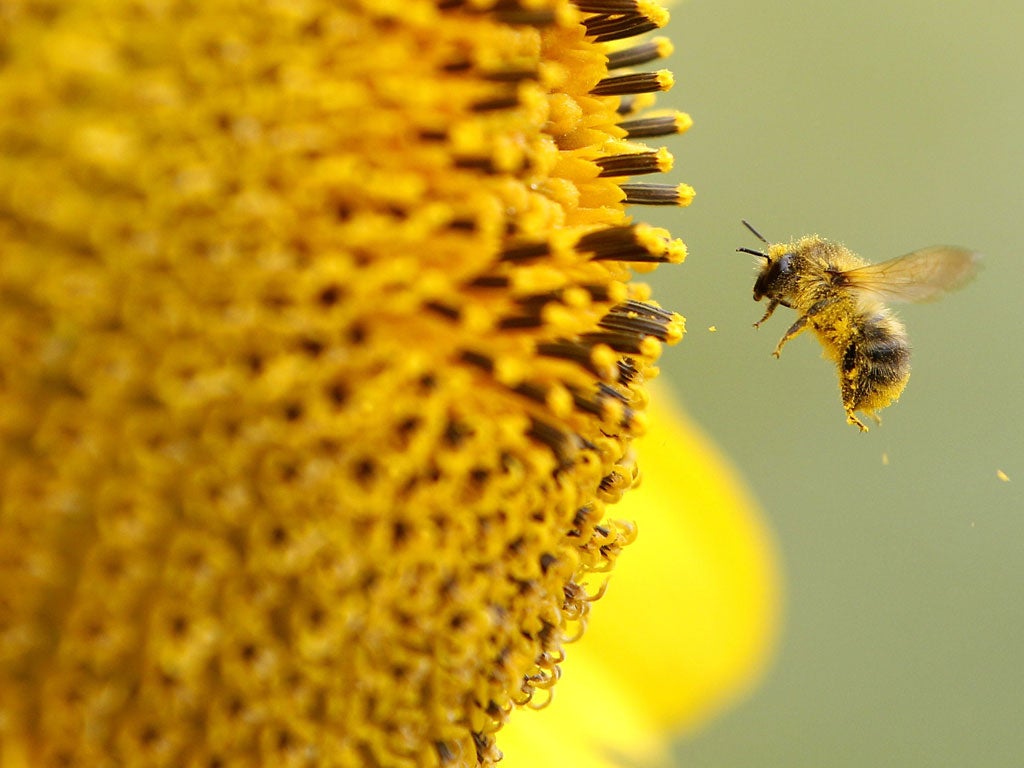No ban on pesticides that 'threaten bees'
European and American reports say nerve agents may be a danger, but the UK goes on using them

Your support helps us to tell the story
From reproductive rights to climate change to Big Tech, The Independent is on the ground when the story is developing. Whether it's investigating the financials of Elon Musk's pro-Trump PAC or producing our latest documentary, 'The A Word', which shines a light on the American women fighting for reproductive rights, we know how important it is to parse out the facts from the messaging.
At such a critical moment in US history, we need reporters on the ground. Your donation allows us to keep sending journalists to speak to both sides of the story.
The Independent is trusted by Americans across the entire political spectrum. And unlike many other quality news outlets, we choose not to lock Americans out of our reporting and analysis with paywalls. We believe quality journalism should be available to everyone, paid for by those who can afford it.
Your support makes all the difference.Nerve-agent pesticides should not be banned in Britain despite four separate scientific studies strongly linking them to sharp declines in bees around the world, Government scientists have advised.
An internal review of recent research on neonicotinoids – pesticides that act on insects' central nervous systems and are increasingly blamed for problems with bee colonies – has concluded that no change is needed in British regulation.
The British position contrasts sharply with that of France, which in June banned one of the pesticides, thiamethoxam, made by the Swiss chemicals giant Syngenta. French scientists said it was impairing the abilities of honey-bees to find their way back to their nests. The Green MP Caroline Lucas described the British attitude as one of "astonishing complacency".
Concern is growing around the world that the chemicals may affect the ability of bees to pollinate crops, something that would have catastrophic consequences for agriculture. Bee pollination has been valued at £200m per year in Britain and £128bn worldwide.
The French research was published in March in the journal Science at the same time as another study by British researchers from the University of Stirling, implicating neonicotinoids in the decline of bumblebees. The British team showed that production of queens, essential for bumblebee colonies to continue, declined by 85 per cent after they were exposed to "field-realistic levels" of another neonicotinoid, imidacloprid, made by the German company Bayer.
In January, the US government's chief bee researcher published a study showing that imidacloprid makes honeybees far more susceptible to disease, even at doses so low as to be barely detectable. And in April, a team from Harvard claimed to show that imidacloprid was the culprit in colony collapse disorder, in which bees abandon their hives en masse.
All four of these studies have been the subject of a British Government review ordered by Sir Robert Watson, chief scientist at the Department for Environment, Food and Rural Affairs (Defra) – which has concluded that no action needs to be taken against the chemicals concerned.
The reports were reviewed by the Chemicals Regulation Directorate (CRD) which deals with pesticides, and the Advisory Committee on Pesticides (ACP), the statutory body that advises ministers. After considering a CRD paper on the research, ACP members agreed that "while they could not discount the findings… they did not affect the current regulatory decisions".
The ACP says more research is necessary "to clarify the papers' findings, and their relevance to the UK field situation". Government scientists have also taken into account a review of Italian research linking bee problems with neonicotinoids, carried out by the European Food Safety Authority. The EFSA said it was "not possible to draw a firm conclusion" on the research.
Sir Robert Watson said: "What they've concluded is that there is no reason at this moment to change regulation, because there is a concern that the laboratory studies did not simulate adequately the field conditions."
Systemic risk: A case of overkill
One of the major problems with neonicotinoid pesticides is that they are "systemic", meaning they are taken up into every part of the plant which is treated with them – including the pollen and nectar.
This means that bees and other pollinating insects can absorb them and carry the poison back to their hives or nests – even if they are not the insecticide's target species.
Introduced by Bayer in the early 1990s, neonicotinoids have been an immense commercial success – Bayer's imidacloprid was its top-selling insecticide in 2009, earning £510m – and have been used on vast areas. About 30 per cent of British cropland – 3.14 million acres – was being treated with the chemicals in 2010.
Join our commenting forum
Join thought-provoking conversations, follow other Independent readers and see their replies
Comments